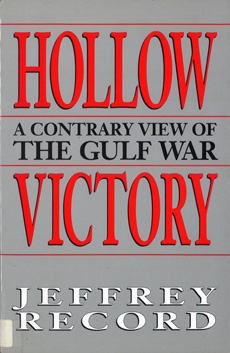|
1
Looking Back
There have been many books published on the 1991 Persian Gulf War and U.S. involvement in that extraordinary conflict. It is thus important to define here what this book is not and why it is different. It is neither a history of the Gulf War nor a survey of the operational and technological lessons learned from that experience. It is not an extended account of the diplomatic relations between the United States and Iraq prior to the conflict, nor a detailed recitation of the Bush administration’s decisionmaking during the crisis after the invasion of Kuwait on August 2, 1990. It is not solely focused on lessons learned; perhaps never in history have so many lessons been learned by so many so quickly.1
What follows here, rather, are commentaries on the broader political, military, and strategic questions raised by the war and its aftermath— questions old, new, and unresolved. In this book, I have sought to raise important issues and to provide insights off the beaten path of so-called conventional wisdom about the war. I have tried to live up to my reputation for asking hard questions of the U.S. military and of political leaders. This may be even more important in the glow of what may turn out to have been a “hollow victory.” For the United States in the post-World War II era, the war in the Persian Gulf was unique. It was short, victorious, and cheap. It was waged against a patently monstrous tyrant on behalf of the United Nations and in concert with genuinely helpful allies. It occasioned but modest domestic political dissent; on the contrary, it prompted a popular (albeit short-lived) outpouring of affection and respect for the U.S. military unprecedented since V-E Day. It seemingly vindicated not only the enormous investment in U.S. defense modernization made in the 1980s but also America’s new post-cold war status as the world’s only remaining superpower. It was also the only foreign conflict in American history that did not catch U.S. military forces unprepared and in which U.S. war costs were financed largely by foreign contributions. It was, in short, a splendid affair.
The war, however, raised some troubling issues that have yet to be fully or satisfactorily explored. Was the conflict, for example, avoidable? Before August 2, 1990, U.S. policy toward Iraq rested on an assumption that Saddam Hussein and his Baathist regime, presumably preoccupied with reconstructing an Iraq battered by eight years of brutal combat with Iran, could be molded into a force for moderation in the Middle East via U.S. encouragement, credits, and technology transfers. Might a no appeasing, sterner policy have dissuaded Saddam from attacking Kuwait?
The avoid ability of war was also the principal issue joined by the prewar public and congressional debate over the efficacy of economic sanctions. There is little doubt that U.N.-imposed and U.S. Navy-enforced sanctions had crippled Iraq’s economy and damaged its military readiness well before the beginning of Operation Desert Storm on January 16, 1991, although we will never know for sure whether a continuation of sanctions alone would have compelled an Iraqi withdrawal from Kuwait. Saddam’s survival of both sanctions and war underscores both the difficulty of translating economic pain into political leverage, and the innate resilience of totalitarian states to external attempts to impose internal change.
It is far from clear, however, whether the Bush administration would have been satisfied with a resolution of the Kuwait crisis short of war. A voluntary Iraqi withdrawal from Kuwait would have satisfied the major declared political objective of the U.S.-led coalition, though it would have left Iraqi military power intact and Saddam himself (presumably) still in control of Iraq’s destiny. The White House clearly harbored intentions against Iraq—the dictator’s removal and his country’s disarmament—that not only exceeded any strict interpretation of the U.N. mandate, but also, given Saddam’s seemingly mindless intransigence from August 2, 1990, to
January 16, 1991, could be accomplished only by war. This disparity between more limited formal objectives and ambitious, undeclared aims continues to hamper attempts at judging the war’s ultimate success or failure.
The Gulf War also raised important questions about America’s ability to assess accurately the military prowess of non-Western adversaries, and about the Bush administration’s decision-making process. The U.S. intelligence community and other expert opinion as a whole significantly overestimated Iraq’s actual military capabilities. The reasons included a cultural predisposition to exalt the quantifiable indices of military power at the expense of more difficult and subjective inquiries into such unquantifiable factors as historical performance, morale, quality of organization and operational doctrine, and cultural receptivity to modem warfare’s institutions and technologies. Indeed, throughout this century the United States has, with respect to non-Western opponents, consistently underestimated their fighting power (the Philippine insurrections, the Chinese in Korea, and the North Vietnamese army and its Viet Cong auxiliaries in Indochina) or given them far too much credit (the Iraqi army).
As for the decision -making process, there is no question that the much- applauded Goldwater-Nichols Defense Reform Act of 1986 paid off handsomely at the operational and tactical levels of command in the Gulf War. Unlike the American military effort in Vietnam, in the Persian Gulf there was a single command authority that counted, and he was accorded the necessary latitude to fight a single, integrated, joint-service and combined-national military campaign. There was only one war, not a collection of individual service wars, and in the air there was only a single daily air tasking order, not a bundle of several separate air wars.
…..
|
